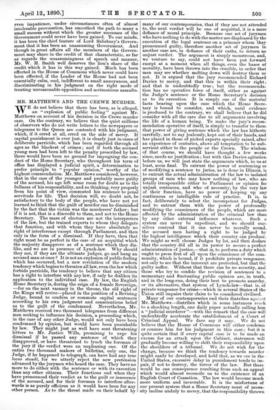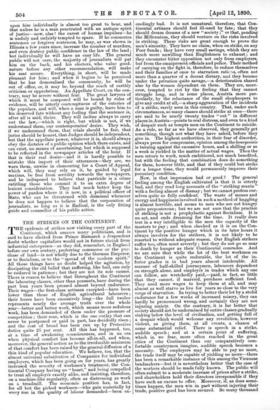MR. M.A.T.MEWS AND 'LELA CREWE MURDER.
WE do not believe that there has been, as is alleged, an "explosion of public feeling" against Mr. Matthews on account of his decision in the Crewe murder case. On the contrary, we believe that the quiet millions of observers who do not write letters to the newspapers or telegrams to the Queen are contented with his judgment, which, if it erred at all, erred on the side of mercy. If capital punishment is ever just, it is clearly just in cases of deliberate parricide, which has been regarded through all ages as the blackest of crimes ; and if both the accused young men had been left to the penalty prescribed by law, there would have been no ground for impugning the con- duct of the Home Secretary, who throughout his term of office has displayed a judicial spirit, a determination to prefer principle to "popular opinion," worthy of the highest commendation. Mr. Matthews considered, however, that in the case of the younger and probably more guilty of the accused, his age left some room for doubt as to the fullness of his responsibility, and so thinking, very properly from his point of view, commuted his sentence to penal servitude for life. That decision will, we doubt not, be satisfactory to the body of the people, who have not yet learned to think that the guilt of murder can be diminished by the fact that the victim was the murderers' father; but if it is not, that is a discredit to them, and not to the Home Secretary. The mass of electors are not the interpreters of the law, but the trained experts to whom they delegate that function, and with whom they have absolutely no right of interference except through Parliament, and then only in the form of a dismissal. If they have, then that right must be as perfect in the case of an acquittal which the majority disapprove as of a sentence which they dis- like, and. we are in presence of Lynch-law. Why should they not, if they are the ultimate judges, go and hang an accused man at once ? It is not an explosion of public feeling which has occurred, but a new revelation of the modern tendency which begins to threaten all law, even the law which forbids parricide, the tendency to believe that any citizen has a right to interfere with any law, if only he dislikes its application to the individual case. By law, the English Home Secretary is, during the reign of a female Sovereign, —for on the next vacancy in the throne, the old right of the Kings will revive—placed in the position of a Revising Judge, bound to confirm or commute capital sentences according to his own judgment and conscientious belief as to the guilt of the condemned. Nevertheless, Mr. Matthews received two thousand telegrams from different men seeking to influence his decision, a proceeding which, in the ease of any other Judge, would not only have been condemned by opinion, but would. have been punishable by law. They might just as well have sent threatening letters to Mr. Justice Wills, promising to urge his dismissal if he passed any sentence of which they disapproved, or have threatened to lynch the foreman of the jury if the verdict were an unpleasing one. Of the entire two thousand makers of bulletins, only one, the Judge, if he happened to telegraph, can have had any true locus statute, for we utterly reject the new pretension advanced by the jurymen who heard the case. They have no more to do either with the sentence or with its execution than any other citizens. Their functions end when they have pronounced their verdict as to the guilt or innocence of the accused, and. for their foreman to interfere after- wards is as purely officious as it would have been for any other person. As to the threat made on their behalf by many of our contemporaries, that if they are not attended to, the next verdict will be one of acquittal, it is a mere defiance of moral principle. Because one set of jurymen who have nothing to do with the matter are displeased. by the execution of the legal sentence on a prisoner whom they pronounced guilty, therefore another set of jurymen in another case are, in defiance of their oaths, to return an unjust verdict. The argument is simply monstrous, and, we venture to say, could not have been put forward except at a moment when all things, even the bases of morality, have been thrown into the crucible, in order that men may see whether melting down will destroy them or not. It is argued that the jury recommended Richard Davies to mercy, and that this is within their right ; and that is undoubtedly true ; but the recommenda- tion has no operative force of itself, either as against the Judge's sentence or the Home Secretary's decision as to its execution. It is simply one of the material facts bearing upon the case which the Home Secre- tary is bound to consider, and which, until evidence is produced. to the contrary, we shall believe that he did consider with all the care due to all arguments involving the life of a human being. To make the jury's recom- mendation operative of itself, is simply to transfer to them that power of giving sentence which the law has hitherto carefully, not to say jealously, kept out of their hands, and has placed in those of picked experts specially raised, after an experience of centuries, above all temptation to be sub- servient either to the people or the Crown. The wisdom of that course, we should have thought a few weeks since, needs no justification; but with this Davies agitation before us, we will just state the arguments which, to us at least, seem final. To entrust the power of sentencing or of modifying a sentence to juries, as is done in Illinois, is to entrust the actual administration of the law to isolated groups of men who may know nothing of law, who are totally irresponsible either to Parliament or opinion for unjust sentences, and who of necessity, by tho very law of their function, have no power of keeping up any continuous or intelligible rule of practice. It is, in fact, deliberately to select the incompetent for Judges, and to entrust them with the power of profoundly modifying the consciences of the people, which are more affected by the administration of the criminal law than by any other external influence whatever. Such a system can never be expedient, and we should our- selves contend that it can never be morally sound, the accused men having a right to be judged by the highest intelligence which their country can produce. We might as well choose Judges by lot, and then declare that the country did all in its power to secure a perfect administration of justice,—that is, to perform a duty which ought to press first of all upon the conscience of the com- munity, which is bound., if it prohibits private vengeance, not only to see that the innocent are protected, but that the guilty suffer. Without that there can be no security, and those who try to confide the revision of sentences to a momentary and fluctuating public opinion are, in truth, and in the long-run, doing their best to promote anarchy, or its alternative, that system of Lynch-law—that is, of private vengeance for crime—which in several States of the Union still impairs their claim to be considered civilised. Many of our contemporaries end their diatribes against Mr. Matthews—diatribes which in some instances reach to a, shocking length, one daily paper actually calling him a "judicial murderer "—with the remark that the case will undoubtedly accelerate the establishment of a Court of Criminal Appeal. We dare say it may. We do not believe that the House of Commons will either condemn or censure him for his judgment in this case ; but it is quite certain that if every capital case is to be made an excuse for an attack upon the Cabinet, statesmen will gradually become willing to shift their responsibility upon the shoulders of a tribunal. We do not wish for the change, because we think the tendency towards murder might easily be developed, and hold that, as we see in the United States, excessive delay in punishment tends to im- pair, if not to destroy, the terror of the law. But there would be one consequence resulting from such an appeal which would almost reconcile us to the existence of an English Court of Caseation. The law would become much more uniform and inexorable. It is the misfortune of our present system that a Home Secretary must of neces- sity incline unduly to mercy, that the responsibility thrown upon him individually is almost too great to bear, and that unless he is a man penetrated with an antique spirit of justice—now, alas ! the rarest of human impulses—he is unduly and unfairly tempted to spare. If he commutes sentences or forgives sentences, he may, as was shown in Illinois a few years since, increase the number of murders, and even destroy public confidence in the law of the land ; but individually he will have an easy life. The general public will not care, the majority of journalists will pat him on the back, and, his electors, who value good- nature before any other recommendation, will make his seat secure. Everything, in short, will be made pleasant for him ; and when it begins to be perceived that he has demoralised the community, he will be out of office, or, it may be, beyond the reach of earthly criticism or opprobrium. An Appellate Court, on the con- trary, may be severe without fear. The great lawyers of which it must be composed will be bound by rules of evidence, will be utterly contemptuous of the outcries of the populace, and will, when a man is guilty, leave him to his deserved fate without any feeling that the sentence is, after all is said, theirs. They will incline always to carry out the law,—which is right, but which is not, if we understand them, our contemporaries' desire. They wish, if we understand them, that trials should be fair, that juries should be honest, that Judges should be independent, but that the appellate power, whatever it is, should always obey the dictates of a public opinion which there exists, and can exist, no means of ascertaining, but which is supposed to be reflected in the newspaper articles of the hour. If that is their real desire—and it is hardly possible to mistake this import of their utterances—they are, we warn them, unwise in clamouring for a Court of Appeal, which will, they may rely on it, be guided by legal maxims, be free from servility towards the newspapers, and be indisposed to believe that parricide is a crime entitling those who commit it to an extra degree of lenient consideration. They had much better keep the power of pardon where it is now, in a political officer of State, who can be threatened with dismissal whenever he does not happen to believe that the corporation of journalists, so long as it is Radical, is the only fitting guide and counsellor of his public action.



































 Previous page
Previous page